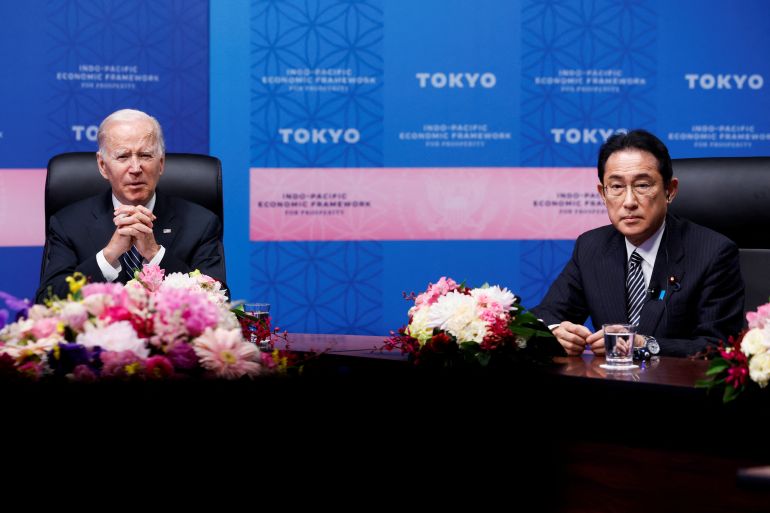Biden launches economic framework aimed at countering China
Indo-Pacific Economic Framework for Prosperity will have 12 Asia-Pacific members, including South Korea and Japan.

US President Joe Biden officially launched his long-awaited economic framework aimed at countering growing Chinese influence in Asia, announcing 12 Asia-Pacific partners who will work on common standards in areas including clean energy and infrastructure.
Biden unveiled the Indo-Pacific Economic Framework for Prosperity (IPEF) in Japan on Monday during the second leg of an Asia trip aimed at shoring up US engagement in the region.
Keep reading
list of 4 itemsShireen Abu Akleh’s colleagues find strength in her legacy
‘Death sentence’: Doctors in Sri Lanka decry medicine shortage
Biden says US would defend Taiwan if attacked by China
The IPEF, which aims to boost ties through common standards in different economic sectors, will initially include South Korea, Australia, Brunei, India, Indonesia, Japan, Malaysia, New Zealand, the Philippines, Singapore, Thailand, and Vietnam. In total, the countries account for about 40 percent of global economic output.
The framework includes four pillars: trade; supply chains; clean energy and infrastructure; and tax and anti-corruption.
“We’re here today for one simple purpose: the future of the 21st Century economy is going to be largely written in the Indo-Pacific. Our region,” Biden said in Tokyo. “This framework should drive a race to the top.”
The framework represents Biden’s latest attempt to boost engagement in the Asia-Pacific following then President Donald Trump’s abrupt withdrawal from the Trans-Pacific Partnership (TTP) trade agreement in 2017.
Firm details for implementing the framework, which Biden first announced in October, will be shored up through discussions with partner countries, which will be able to choose which areas in which they want to participate.
The Biden administration, however, has made clear the IPEF is not a traditional trade agreement that would expand Asia-Pacific countries’ access to the US market. The framework’s limited scope and lack of binding commitments have been viewed with disappointment by some analysts and officials in the region, who argue Washington should seek economic engagement on a broader scale.
“For the US to compete for influence and to shape the contours of regional order it has to have a strong and coherent economic strategy that is compelling for Asian states,” Nick Bisley, the dean of humanities and social sciences and professor of international relations at La Trobe University in Australia, told Al Jazeera. “The problem with the framework is that it sets out a high-level set of intentions, all of which make sense, but until specific agreements are hammered out and agreed to then the actual impact is impossible to gauge.”
Still, observers cast the framework as a welcome starting point for counties keen for greater US engagement in the region.
“Secure supply chains will be a strong point,” Kang Sung-jin, an economics professor at Korea University in Seoul, told Al Jazeera.
Kang said the IFEP’s focus on digital economy and technology standards could provide a boost to South Korea’s crucial semiconductor industry.
“Japan deters experts of some important parts of the semiconductor sector due to political reasons,” he said, adding that he believed this would be less likely under the framework.
The launch of the IPEF is the centerpiece of Biden’s two-day visit to Japan, which includes meetings with Japanese officials including Prime Minister Fumio Kishida and the the leaders of fellow “Quad” members India and Australia, all of whom share concerns about China’s increasing assertiveness.
Huynh Tam Sang, a lecturer of international relations at the University of Social Sciences and Humanities in Ho Chi Minh City, said the framework could attract other countries wary of China in the future.
“The US should be open for other countries to join later, as China has been really growing in terms of economic coercion over regional countries,” Huynh told Al Jazeera.
Huynh said, however, there could be limits to which governments could join, with Cambodia and Laos likely wanting to avoid antagonising China and Myanmar experiencing isolation on the international stage.
Beijing has criticized the framework, with foreign minister Wang Yi on Sunday declaring that China “opposes attempts to create division and confrontation”.
“The Asia-Pacific should become a high ground for peaceful development, not a geopolitical gladiatorial arena,” Wang said, calling the IPEF “a strategy to undermine peace”.